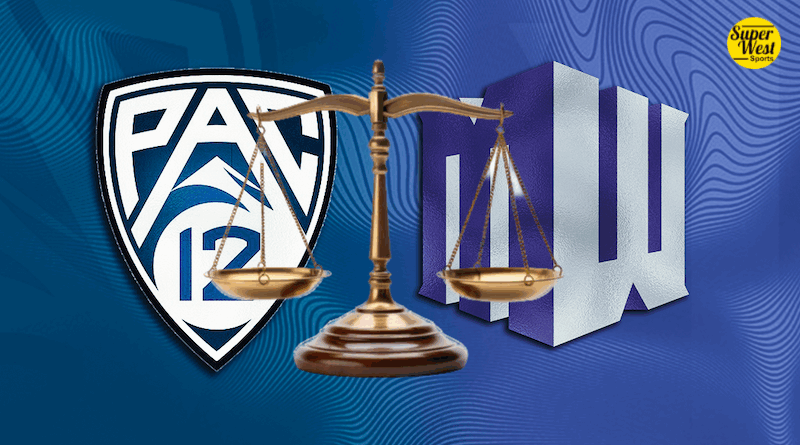
By SuperWest Sports Staff
July 15, 2025
In the wake of Tuesday’s joint announcement by the Pac-12 and Mountain West conferences that mediation negotiations had failed, the legal matter between them now appears headed to court.
![]() The case involves $155 million in “poaching fees” and exit fees, which the Mountain West claims it is owed, over which the Pac-12 and several of its new members have sued.
The case involves $155 million in “poaching fees” and exit fees, which the Mountain West claims it is owed, over which the Pac-12 and several of its new members have sued.
Given the complexities involved, we asked Google’s large language model AI bot, “Gemini,” to weigh in by submitting the following prompt:
![]()
![]()
Here is Gemini’s full reply. We did not edit or alter the text except to add graphics and format it in keeping with our style.
From https://gemini.google.com/app (accessed July 15, 2025):
The ongoing legal dispute between the Pac-12 and Mountain West conferences over “poaching fees” and exit fees is complex, and predicting a clear winner in a trial is difficult.Both sides have arguments they are confident in, and the outcome could depend heavily on how the specific contract language is interpreted by the court, as well as broader principles of contract law and antitrust.
Here’s a breakdown of each side’s likely arguments and potential strengths/weaknesses.
Mountain West’s Position
Argument
The Mountain West asserts that the “poaching fees” were a legitimate stipulation in the scheduling agreement entered into with the remaining Pac-12 members (Oregon State and Washington State) for the 2024-25 football season.
This agreement was made to help the Pac-12 maintain a viable schedule after losing most of its members. They contend that the Pac-12’s subsequent addition of five Mountain West schools (Boise State, Colorado State, Fresno State, San Diego State, and Utah State) triggered these agreed-upon penalties.
They claim the Pac-12 owes approximately $55 million in poaching fees, plus additional exit fees from the departing schools (which could total over $150 million combined with poaching fees).
Strengths
Contractual Language: If the “poaching fee” clause is clearly written and unambiguous in the scheduling agreement, the Mountain West has a strong case based on contract enforcement.
“Bargained-for-Exchange”: The Mountain West could argue that these fees were a critical part of the consideration for them to help the Pac-12 with scheduling, and without them, they would not have entered into the agreement.
Preserving Conference Stability: They may argue that such clauses are necessary to protect conferences from being raided by others, allowing them to maintain stability and plan for their future.
Weaknesses
Unconscionability/Public Policy: The Pac-12 is likely to argue that the “poaching fees” are “unlawful and intended to obstruct our ability to act in the best interests of our student-athletes and member institutions.”
This could fall under arguments of the clause being unconscionable or against public policy, especially if the fees are deemed excessively punitive and disproportionate to actual damages suffered by the Mountain West.
Antitrust Concerns: There’s a potential for the Pac-12 to raise antitrust arguments, claiming that such fees restrain trade or competition in the college athletics landscape.
Pac-12’s Position
Argument
The Pac-12 has filed a lawsuit to challenge the legality and enforceability of these “poaching penalties,” arguing that the agreement was signed “under duress” due to its desperate situation at the time.
They claim these provisions are “unlawful” and impede their ability to act in the best interests of their members. The new Pac-12 (with its incoming members) also challenges the significant exit fees the departing schools owe to the Mountain West.
Strengths
Duress Argument: If the Pac-12 can successfully demonstrate that they were in such a vulnerable position that they had no real choice but to agree to the “poaching fees,” a court might consider the agreement to have been made under duress, rendering certain clauses unenforceable.
Public Policy/Antitrust: As mentioned, they could argue that such high “poaching fees” are anti-competitive and harmful to the broader collegiate sports ecosystem by restricting schools’ ability to seek better opportunities.
Reasonableness of Damages: They might argue that the $55 million in poaching fees, and the overall $150 million in combined fees, are an unreasonable penalty and far exceed any actual damages suffered by the Mountain West.
Weaknesses
Freedom of Contract: Courts generally uphold contracts that are freely and knowingly entered into by sophisticated parties. Proving “duress” in a commercial context like this can be challenging.
Clear Language: If the contractual language is explicit, the Pac-12 faces an uphill battle in arguing against its enforceability unless they can establish a compelling legal reason (like unconscionability or antitrust violations).
Overall Likelihood and Considerations
Difficulty of Proving Duress: Historically, courts are hesitant to invalidate contracts based on duress in commercial settings unless there’s a clear demonstration of improper threats or coercion that left no reasonable alternative.
The Pac-12’s “desperate situation” might be seen as a business risk rather than legal duress.
Focus on Contract Interpretation: The core of the case will likely hinge on the precise wording of the scheduling agreement and the “poaching fee” clause. If the language is clear and unambiguous, the Mountain West has a stronger hand.
Antitrust is a Wildcard: Antitrust arguments are complex and can be unpredictable. If the Pac-12 can successfully frame the “poaching fees” as an illegal restraint of trade, it could significantly impact the outcome.
Prior Settlements/Precedents: While specific to individual conference bylaws and agreements, past legal battles over conference realignment and exit fees could offer some guidance, though each case has unique facts.
Desire for Settlement: Despite mediation failing, both sides likely prefer a settlement to the uncertainty, expense, and public scrutiny of a full trial. University presidents often want to avoid prolonged litigation.
Conclusion
Given that mediation has failed, it signals that both sides believe they have a strong enough case to proceed to court. However, the Mountain West may have a slight edge if the “poaching fee” clause in the scheduling agreement is clearly and unambiguously written.Contract law generally favors the enforcement of agreed-upon terms between sophisticated parties.
The Pac-12’s best hope likely lies in successfully arguing that the fees are an illegal restraint of trade or so punitive as to be unconscionable, or that they signed under a degree of duress that invalidates the contract, which are higher legal bars to clear.
Ultimately, without seeing the exact contractual language and all presented evidence, it’s impossible to say definitively. However, the default position in contract disputes often favors the party seeking to enforce a clearly stated agreement.





